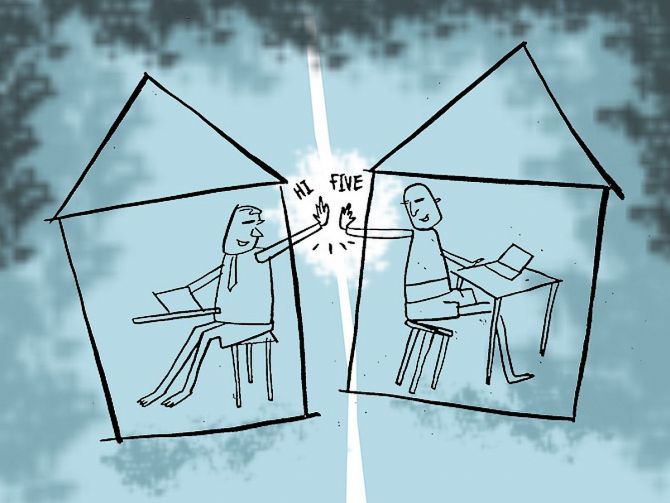Fear of the disease has affected the way employees commute, the number of coffee breaks they take, and even their conversations with colleagues.
Does a restricted environment affect the spirit of interaction and collaboration that offices are meant to inspire, wonders Ranjita Ganesan.

The vision of someone walking into the bank in a balaclava usually sets off alarm bells, but nobody panicked when a man wearing a thick black hood, with just a slit for his eyes, appeared at the door of a big private lender in Parel, Mumbai, recently.
The guard did point a gun at him but only to check his temperature, before showed him to a seat after two mandatory pumps of sanitiser.
It is mainly people without masks that worry employees in the branch, which is located in Lalbaug, a Covid-19 hotspot not long ago.
“There is always a risk, even while following safety protocols, and keeping distance between customers and desks,” says Ajay Singh, a relationship officer here, for whom the simple act of sharing a pen with clients has become a loaded decision ever since he returned to the bank in June.
“The work atmosphere feels totally different now, very restricted.”
The sights and sounds associated with the workplace are changing for many employees who have resumed office-going in these pandemic-hit conditions.
While several companies have given their workforce the option to stay home until the end of the year, other employees — mainly in essential sectors or site-based roles — have slowly and cautiously been heading out a few days each week.
Fear of the disease has affected the way they commute, the number of coffee breaks they take, and even their conversations with colleagues.
But as weeks pass, some say they have eased their guard and learnt to live with the virus too.
“There wasn’t a single person or car on the Bandra-Worli Sea Link, just crows,” says Murchana Borah, recalling her daily ride in the weeks just after lockdown was lifted.
The Malad-based cataloguer, who works at a film archive in Tardeo, likens travelling in that period to being in a “post-apocalyptic movie”.
Her employer would send a private vehicle to fetch her for some months but she switched to public transport when Mumbai’s local trains opened up only for women in October.
Does a restricted environment affect the spirit of interaction and collaboration that offices are meant to inspire?
With masks on, desks at a distance, and employees attending work in rotation, things are quieter now.
A large portion of workplace chatter is about the Covid-19 situation in everyone’s respective neighbourhoods.
The months of working from home seems to have improved communication, at least in the estimation of Ruta Waghmare, a curator at the Bhau Daji Lad Museum in Mumbai.
“It has made us better managers and team workers.
"We began consciously and clearly communicating all decisions remotely, and that has continued even now,” she says.
On the flip side, tempers sometimes fly in the course of sharing an office and navigating an invisible risk.
At first, even a slight cough would turn heads and lead to the cougher being “ostracised”.
Anay Pantojee, a design professional working with a radio station in Mumbai, has witnessed open shaming of “covidiots” — those who recklessly flout safety measures — in his office.
One such showdown even involved dismantling of workplace hierarchies, where a mid-level employee confidently took on the head of department.
“The rules are the same for all now. People have realised that only they can protect themselves in such times,” he observes.
Breaks are no longer as relaxing.
In many cases, canteens have shut and office cutlery has been removed.
The usual huddles around tea and cigarette shops have thinned out, too.
“We are fans of filter coffee in my office, but the young man who used to bring us a flask every evening went back to his village during the lockdown,” says Deepthi Nataraj, a public relations executive based in Bengaluru, “We got an induction stove in the pantry to make our own, but it is hardly the same.”
Bhau Daji Lad Museum’s Waghmare does not get a phone call from her colleagues anymore asking if they should pick up breakfast — usually a bun maska or chicken roll from the nearby Byculla Bakery.
Employees have mostly taken to bringing packed meals and eating at the desk.
Employees are often stressed over returning home at the end of their shift.
“There is a spray-on sanitiser machine in the office, I literally bathe in it while entering and exiting,” says Pantojee, who has a newborn and parents at home.
Singh has made peace with spending on a private cab both ways, privileging his safety over savings.
Because his work exposes him to more people than is ideal in pandemic conditions, he asks his mother to stay isolated and turned down invitations from friends to visit on Diwali.
Like many others, he rationalises the mounting pressures and expenses in his life by looking at the bigger picture.
“I am not as badly affected. Some of my friends in smaller banks have lost their jobs.”
| The world of work |
|
Usual huddles around tea and cigarette shops have thinned out Breaks are no longer as relaxing In many cases, canteens have shut and office cutlery has been removed Sometimes there is open shaming of “covidiots” — those who recklessly flout safety measures With rules same for all, workplace hierarchy is sometimes impacted Using the common office washroom still makes people nervous Instead of taking public transport, some are spending on private cabs both ways, choosing safety over savings |











